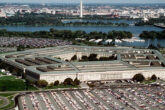October 04, 2022
The Downside of Imperial Collapse
Wars are historical hinges. And misbegotten wars, when serving as culmination points of more general national decline, can be fatal. This is particularly true for empires. The Habsburg empire, which ruled over central Europe for hundreds of years, might have lingered despite decades of decay were it not for its defeat in World War I. The same is true of the Ottoman Empire, which since the mid-nineteenth century was referred to as “the sick man of Europe.” As it happened, the Ottoman Empire, like the Habsburg one, might have struggled on for decades, and even re-formed, were it not for also being on the losing side in World War I.
Empires form out of chaos, and imperial collapse often leaves chaos in its wake.
But the aftershocks of such imperial comeuppance should never be underestimated or celebrated. Empires form out of chaos, and imperial collapse often leaves chaos in its wake. The more monoethnic states that arose from the ashes of the multiethnic Habsburg and Ottoman empires often proved to be radical and unstable. This is because ethnic and sectarian groups and their particular grievances, which had been assuaged under common imperial umbrellas, were suddenly on their own and pitted against one another. Nazism, and fascism in general, influenced murderous states and factions in the post-Habsburg and post-Ottoman Balkans, as well as Arab intellectuals studying in Europe who brought these ideas back to their newly independent postcolonial homelands, where they helped shape the disastrous ideology of Baathism. Winston Churchill speculated at the end of World War II that had the imperial monarchies in Germany, Austria, and elsewhere not been swept away at the peace table in Versailles, “there would have been no Hitler.”
Read the full article from Foreign Affairs.
More from CNAS
-
Ukrainian president has stark new warning as war rages on
Ukrainian President Volodymyr Zelensky warns that Ukraine will lose the war with Russia without US assistance. Franz-Stefan Gady of CNAS explains why US military aid is crucia...
By Franz-Stefan Gady
-
Stock Buybacks in Defense: What Drives Them, and How That Can Change?
Lack of capital is not a problem hindering investment at the largest defense primes. The issue revolves around the capital allocation decision....
By Mikhail Grinberg, Jerry McGinn & Lloyd Everhart
-
Sharper: Maritime Security
The importance of securing the maritime domain is rapidly increasing. From the South China Sea to the Red Sea, the U.S. and its allies are experiencing escalating challenges t...
By Anna Pederson & Charles Horn
-
Innovation Adoption for All: Scaling across Department of Defense
The Department of Defense does act quickly when properly motivated and catalyzed by effective leadership....
By Robert O. Work, Michael Brown & Ellen Lord




